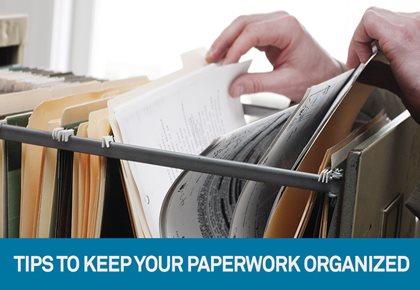Friday February 24, 2017
 Is organizing paperwork on your list of favorite things to do? No? You’re not alone! Although it’s not something that most people enjoy, maintaining good records is critical to the most important functions of your community association. That’s true whether you live in a Brickell area high rise, an Orlando gated community or on the beach in Destin.
Is organizing paperwork on your list of favorite things to do? No? You’re not alone! Although it’s not something that most people enjoy, maintaining good records is critical to the most important functions of your community association. That’s true whether you live in a Brickell area high rise, an Orlando gated community or on the beach in Destin.Following a good organizational system – and following it consistently – can streamline your operations and will increase efficiency, preserve the history of your activities and provide transparency. “Not only is maintaining good records essential when it comes to issues like warranties, invoices and project management, it can make all the difference in the world if your association is involved in a lawsuit,” said Ivy Montero, regional director, FirstService Residential. “Lawsuits are won or lost on what was documented -- in other words, on paperwork.” Take a look at our ideas for making this often-onerous task a little simpler. Before you know it, paperwork won’t be the chore it once was, and your association will run more smoothly because of your efforts.
-
Know what matters the most.
This first step is the most challenging, simply because almost all of the documents your community association will generate are essential, including bids and reports. Crucial pieces of information – such as the Declaration of Condominium or Covenants and Restrictions, Articles of Incorporation, Bylaws and Rules and Regulations – should be kept in an accessible place. In addition, your meeting minutes, communications with homeowners, financial documents such as billing statements, vendor contracts, insurance policies, warranties and maintenance records should be placed into easily identifiable files so that they are readily available when needed. It is important to keep in mind that these documents may go through multiple revisions before arriving at the final document. Typically, once a document is amended, the previous version is no longer valid. While it is okay to save these versions for your association’s reference, you want to ensure that the “final” version of the document is saved as the “official record.”
-
Keep the most important documents easily accessible.
Your governing documents and meeting minutes are essential to residents in your community. The Board will need to reference them for guidance when they have questions, want to settle disputes or are considering upgrades or enhancements to homes in the association that may alter or modify the overall community. Keep these documents accessible to residents, either at a central office or through an internal communications system. Your property management company can help you implement a system that ensures fair access for everyone.
-
Assign a record keeper.
Record keeping is very important and should be assigned to a specific person. Leaving it as anybody’s job usually means it ends up being nobody’s job, so make sure you delegate this critical task to one individual. Consider asking your community association manager or assistant manager to take on the role. If your community is self-managed, this task normally falls to the Board secretary, though any member can be assigned this important duty.
-
Know the laws.
Unfortunately, most state laws don’t provide much guidance. In many states, it’s limited to broad statements requiring that records be kept “in accordance with generally accepted accounting principles.” Still, it’s wise to check with your auditor or the statutes in your state as they can vary greatly. The right property management partner will be well versed in the law and can help you with this aspect of your record keeping. And always consult with your association attorney.
-
Store documents digitally.
Gone are the days of towering stacks of paperwork and overflowing filing cabinets. Electronic record keeping is here to save the day! An excellent community association management company can implement a system that allows you to scan and digitally file important documents. In an age of ongoing digital security threats, they can also help ensure that your community has the correct firewalls and security measures in place too. This provides a safe, secure storing house for your records that is also easily accessible and searchable.
-
Be transparent and keep confidentiality at the same time.
There are many documents that owners have a right to see, such as approved contracts, meeting minutes from open sessions, governing documents and monthly and annual financial statements. Keeping these documents available will maintain transparency between owners and the Board. The other side of the coin, however, is confidentiality. Though owners have broad access to information, there are some areas in which the Board’s privileges supersede those of owners. Communications regarding employment matters, issues of privacy, litigation strategies, certain delinquency matters and ongoing contract negotiations may be protected under applicable law. The association’s attorney can offer guidance in this regard. There are ways to communicate with homeowners without disclosing confidential details, such as providing summaries of pivotal events through community newsletters to keep everyone informed, or holding informal, “informational gatherings” to address any general pressing questions from owners. Remember that it is always wise to have your community association manager and your association attorney available during these types of discussions. Implement the right systems and you’ll find you’ve got a robust collection of essential paperwork that enhances your operation rather than inhibits it.